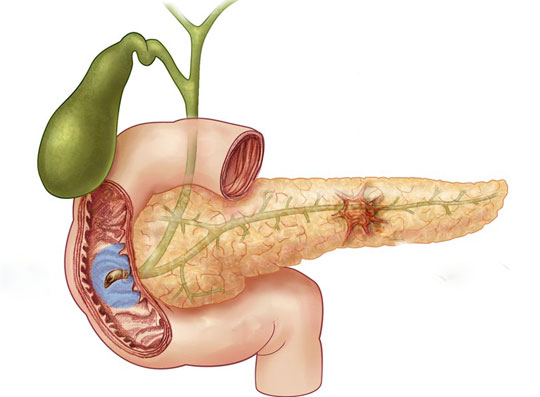According to a study published in the journal Clinical Cancer Research in October, British scientists discovered a protein linked to the development of pancreatic cancer.

Photos are academic. (Internet source).
In their study, scientists at Barts and the London School of Medicine and Dentistry found that nearly a quarter of pancreatic cancer cells have a high concentration of a protein called P110γ.
In experiments, when the production of this protein is blocked, cancer cells also stop growing.
Professor Marco Falasca, director of the study, said: " There are a large number of patients with high P110γ protein levels. In fact, this protein plays an important role in the development of the disease. . "
Professor Falasca and colleagues examined normal pancreatic tissues and cancerous tissues to detect proteins associated with cancer cell growth. About half of all cancers are associated with a member of a protein family - called Phosphoinositide 3-Kinase (PI3K).
Results from the test experiments showed that high levels of P110γ were detected in about 72% of pancreatic cancer tissues, while the protein was not found in normal pancreatic tissues.
Pancreatic cancer is a common cancer in the digestive tract, it accounts for about 10% of gastrointestinal cancer and about 2% of all cancers. The disease is more common in men than in women, usually after age 60, with risk factors such as tobacco, alcohol, coffee, meat, fat, diabetes .
In general, pancreatic cancer is a type of cancer that is difficult to diagnose, so it is often diagnosed late, so prognosis is often difficult. Pancreatic cancer includes exocrine pancreatic cancer - a common type and endocrine pancreatic cancer - this is less common.
To detect pancreatic cancer early, it is necessary to master the following symptoms: usually only early signs of jaundice, then pain and weight loss; pain spreads from the epigastric region to the back, a slight decrease in pain when the patient leans forward, a few cases of transient pain but increased blood amylase, indicates acute pancreatitis due to tumor blockage; weight loss seen in most patients due to anorexia; Dark urine, itchy skin, clay-like stools.
Other manifestations include: venous thromboembolism and moving venous thromboembolism; Hemorrhage is digested from the varicose veins due to tumor suppressing the portal vein system and enlarged spleen because of splenic veins permeate cancer cells.
 Why is Australia the country with the highest cancer rate in the world while Vietnam ranks 100th?
Why is Australia the country with the highest cancer rate in the world while Vietnam ranks 100th? New drug causes cancer to 'starve'
New drug causes cancer to 'starve' Common cancers in men
Common cancers in men America's incredible discovery: The most feared cancer cell is love
America's incredible discovery: The most feared cancer cell is love